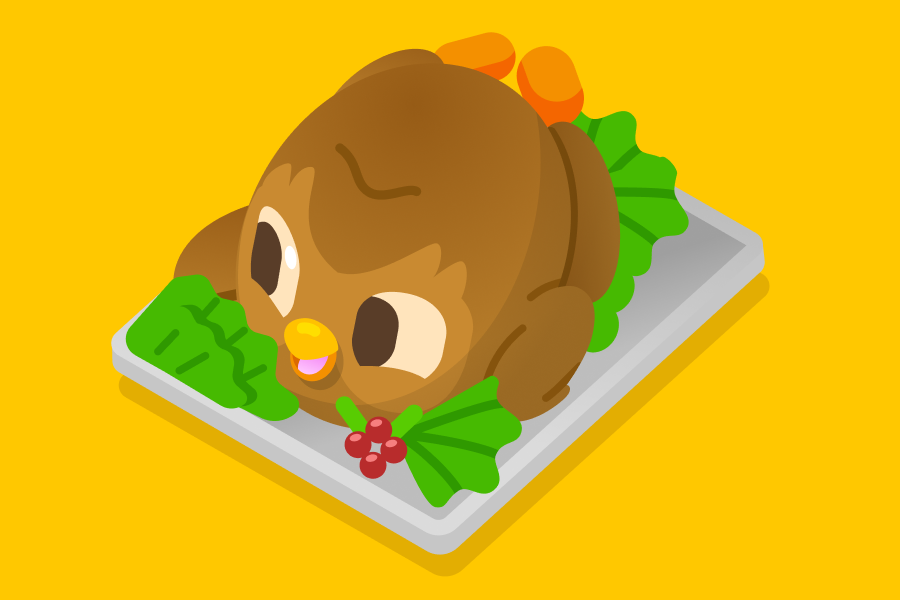This holiday, delight and distract your guests, the host, and your cousins' kids with everyone's favorite conversation starter: word origins! Here are the surprising language stories behind your favorite Thanksgiving foods.
The sides are the main event
We're starting with everyone's favorite… the potatoes! And in a controversial move, we're putting sweet potatoes here in the sides section, and not with desserts—for word origin reasons only! Sweet potatoes were the original potato, or at least, they are the first potato-y vegetable encountered by the Spaniards when they arrived in the Caribbean in the 16th century. They adopted the word patata from the original word batata, which came from one of the Carib languages spoken in Haiti (or possibly another island). Soon potato was being used in English for the sweet vegetable, and by the end of the 1500s, it was also applied to the non-sweet varieties from Peru (which are only distantly related to the sweet potato).
And while we're on the topic of sweet potatoes, we must discuss yams and marshmallows! In reality, yams are not related to sweet potatoes—but for those having Thanksgiving in North America, we recommend steering clear of this divisive debate. May we instead suggest that you focus on the origin of yam, which comes from a West African language that was then adopted by the Spanish and Portuguese before making its way to English! And marshmallow’s origins are quite literal: It's from a kind of mallow (a plant) that grows in marshes, and whose roots were used to make everyone's favorite yam (sweet potato?) topping in centuries past.
For your non-tuber vegetable sides, you can't beat a casserole, which is actually the name of the dish it's prepared in! The French word comes from the Provençal word cassa for a type of pan, and so this side has something in common with North African tagines—also named for the receptacle it's made in.
To round out your plateful of etymologies, Brussels sprouts were popularized by their fans (and farmers) in Belgium hundreds of years ago, squash comes from Narragansett (an indigenous language of New England) and so does succotash (not a traditional Thanksgiving side, but it has the same Narragansett -ash suffix!), and cranberry was repurposed in North America from the German or Dutch kraanbere ("crane" like the bird, plus "berry")—a different swamp-raised berry!
Carve out some space for turkey
Before the tryptophan sets in, you'll want to share this one with the table: Turkey really does come from the name of the country!
Sort of.
It's true that the name of the bird is based on the name of the country Turkey… but it's not true that the bird comes from Turkey!
- Turkey: English turkey, Hindi टर्की (tarkee)
- India: French dinde (from de and Inde), Catalan indiot or gall dindi, Polish indyk, Turkish hindi
- Peru: Portuguese peru, Hindi पेरू (peroo)
- Rome: Arabic الديك الرومي (aldeek alrumi)
- Ethiopia: Arabic ديك الحبش (deek al7abash)
These words can refer to different species in different parts of the world… and that's part of the problem! In the 1500s, the Portuguese brought a particular kind of bird from West Africa to North Africa and modern-day Turkey and then on to Europe—and so different communities used names associated with the journey. Guinea fowl was first used in English (named for the country Guinea in West Africa), and by the 1550s it had been extended to a different species in North America, but soon the name turkey, from a different presumed origin of the guinea fowl, stuck instead!
As the large North American bird became known in other regions, misnomers related to India became common: because it was thought that explorers in North America had sailed to India.
And, of course, a little etymological dessert
Word origins are interesting and often enlightening—when they work out. But often, the history of a word is unclear or inconclusive!
And that is the case with pie. This odd little word has existed in English for at least 700 years, but it's not clear where it came from. Today, some other languages use pie (it's one of the ways of referring to a pie chart in Spanish!), but its origins seem to be from English, and none of the languages related to English have historical evidence of a similar word!
A popular Thanksgiving pie choice, pumpkin comes from a combination of Greek and Dutch words! In Greek, pepon was "melon," and this word made its way to French and later English, where it was joined by the Dutch diminutive ending -kin, for an affectionately funny little melon-y thing.
Bon appetit !
As you carve the turkey, pass the sides, and turn on the game, remember to share a few things you're grateful for this year: fascinating word origins!



